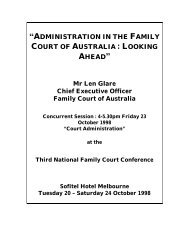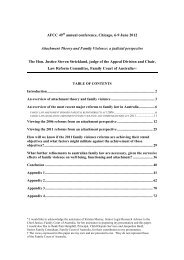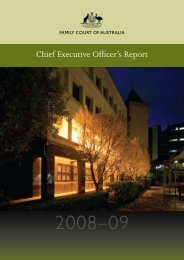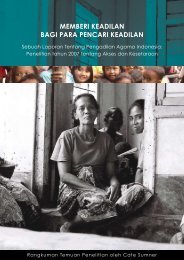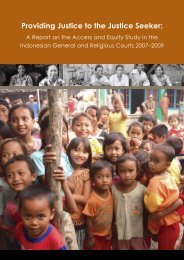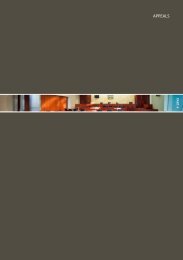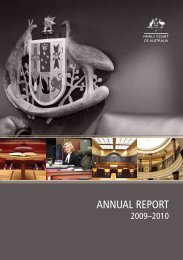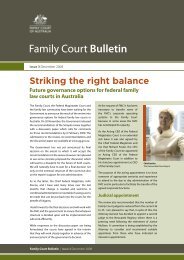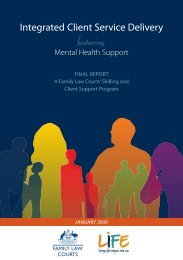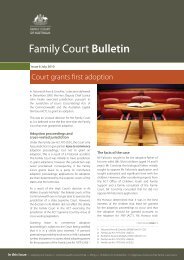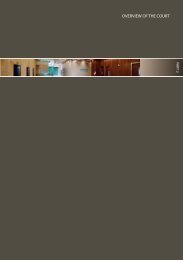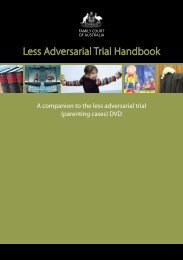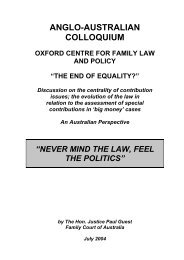Open PDF - Self represented Litigants a challenge - Size 786 KB
Open PDF - Self represented Litigants a challenge - Size 786 KB
Open PDF - Self represented Litigants a challenge - Size 786 KB
Create successful ePaper yourself
Turn your PDF publications into a flip-book with our unique Google optimized e-Paper software.
FAMILY COURT OF AUSTRALIA<br />
Commentary on matters relating to the proposed system’s<br />
lack of jurisprudence or effective research data about the<br />
effectiveness of PDR/ADR<br />
36 The litigation process itself has not been the subject of accurate research<br />
about the needs, desires and satisfaction of its clients. There was agreement<br />
that it would be appropriate for there to be both immediately post litigation<br />
counselling/assessment/exit-polls and perhaps more significantly some<br />
form of follow-up after six months particularly in relation to children’s<br />
orders to ensure that they are being carried out and that there is satisfaction<br />
with them. Despite the obvious drawback of perhaps eliciting further<br />
litigation and the more significant drawback of perhaps encouraging<br />
people to regard "final orders" as experimental, both proposals received the<br />
endorsement of those attending the workshop.<br />
37 In addition and importantly the SRL’s were concerned that in relation to any<br />
consent orders made by the Court there should be a process which enabled<br />
a self-representing litigant to be placed in the witness box and heard as to<br />
his or her real consent to the orders that were being made. Again, this was<br />
a proposal that met with general concurrence. This was also a proposal<br />
relevant to <strong>represented</strong> parties who feel frustrated at the lack of opportunity<br />
to have a say on the day.<br />
38 The processes of Alternative Dispute Resolution (ADR) have not been the<br />
subject of scrutiny nor in large measure could they be. As was pointed out<br />
by Zoë Rathus there is no jurisprudence of mediated agreements. The<br />
process of conflict counselling which has been pioneered by the Family<br />
Court, has not been (until recently) the subject of much scrutiny and the<br />
satisfaction of participants or the success of the process in resolving<br />
disputes, justly and reasonably, is both difficult to gauge and crucial to the<br />
development of future processes in the Court. Even more strongly, the<br />
community based processes of mediation, conciliation or any variation<br />
thereof are difficult to assess. While it is the accepted wisdom that a<br />
chosen solution must necessarily be preferable to an imposed solution, it is<br />
sometimes difficult to assess the quality of the chosen solution for those<br />
participating.<br />
39 Again and again the self-representing litigants, and others participating in<br />
the workshop, emphasised the differences between self-representing<br />
litigants. These differences included, without being exhaustive, differences<br />
in power of negotiation, differences in articulateness, differences in<br />
knowledge and differences in the stage of grieving reached arising from the<br />
breakdown of the relationship.<br />
64



